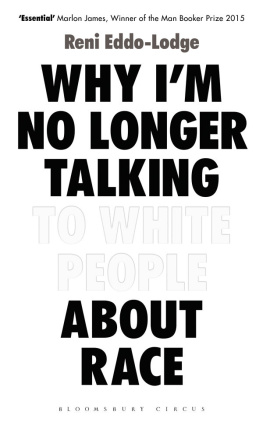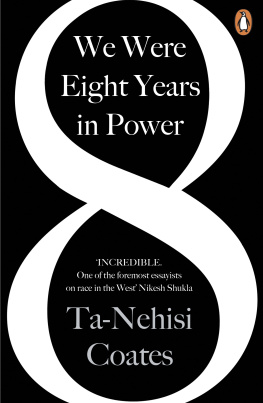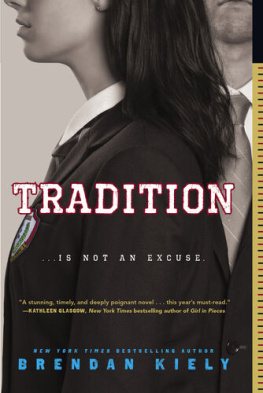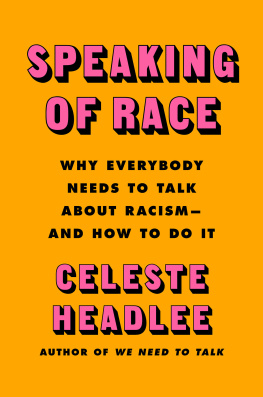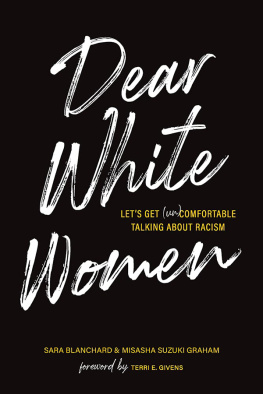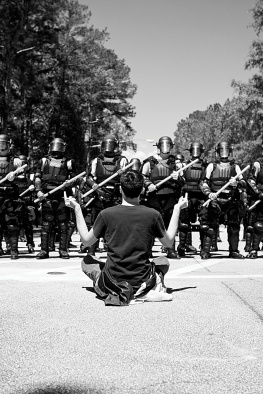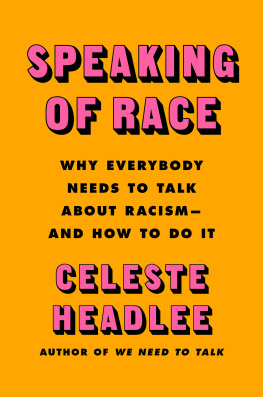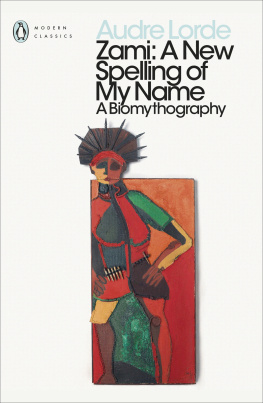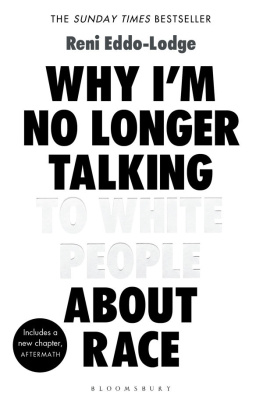WHY IM NO LONGER TALKING TO WHITE PEOPLE ABOUT RACE
For T&T
WHY IM NO LONGER TALKING TO WHITE PEOPLE ABOUT RACE
RENI EDDO-LODGE

CONTENTS
On 22 February 2014, I published a post on my blog. I titled it Why Im No Longer Talking to White People about Race.
It read:
Im no longer engaging with white people on the topic of race. Not all white people, just the vast majority who refuse to accept the legitimacy of structural racism and its symptoms. I can no longer engage with the gulf of an emotional disconnect that white people display when a person of colour articulates their experience. You can see their eyes shut down and harden. Its like treacle is poured into their ears, blocking up their ear canals. Its like they can no longer hear us.
This emotional disconnect is the conclusion of living a life oblivious to the fact that their skin colour is the norm and all others deviate from it. At best, white people have been taught not to mention that people of colour are different in case it offends us. They truly believe that the experiences of their life as a result of their skin colour can and should be universal. I just cant engage with the bewilderment and the defensiveness as they try to grapple with the fact that not everyone experiences the world in the way that they do. Theyve never had to think about what it means, in power terms, to be white, so any time theyre vaguely reminded of this fact, they interpret it as an affront. Their eyes glaze over in boredom or widen in indignation. Their mouths start twitching as they get defensive. Their throats open up as they try to interrupt, itching to talk over you but not really listen, because they need to let you know that youve got it wrong.
The journey towards understanding structural racism still requires people of colour to prioritise white feelings. Even if they can hear you, theyre not really listening. Its like something happens to the words as they leave our mouths and reach their ears. The words hit a barrier of denial and they dont get any further.
Thats the emotional disconnect. Its not really surprising, because theyve never known what it means to embrace a person of colour as a true equal, with thoughts and feelings that are as valid as their own. Watching The Color of Fear by Lee Mun Wah, I saw people of colour break down in tears as they struggled to convince a defiant white man that his words were enforcing and perpetuating a white racist standard on them. All the while he stared obliviously, completely confused by this pain, at best trivialising it, at worst ridiculing it.
Ive written before about this white denial being the ubiquitous politics of race that operates on its inherent invisibility. So I cant talk to white people about race any more because of the consequent denials, awkward cartwheels and mental acrobatics that they display when this is brought to their attention. Who really wants to be alerted to a structural system that benefits them at the expense of others?
I can no longer have this conversation, because were often coming at it from completely different places. I cant have a conversation with them about the details of a problem if they dont even recognise that the problem exists. Worse still is the white person who might be willing to entertain the possibility of said racism, but who thinks we enter this conversation as equals. We dont.
Not to mention that entering into conversation with defiant white people is a frankly dangerous task for me. As the heckles rise and the defiance grows, I have to tread incredibly carefully, because if I express frustration, anger or exasperation at their refusal to understand, they will tap into their pre-subscribed racist tropes about angry black people who are a threat to them and their safety. Its very likely that theyll then paint me as a bully or an abuser. Its also likely that their white friends will rally round them, rewrite history and make the lies the truth. Trying to engage with them and navigate their racism is not worth that.
Amid every conversation about Nice White People feeling silenced by conversations about race, there is a sort of ironic and glaring lack of understanding or empathy for those of us who have been visibly marked out as different for our entire lives, and live the consequences. Its truly a lifetime of self-censorship that people of colour have to live. The options are: speak your truth and face the reprisal, or bite your tongue and get ahead in life. It must be a strange life, always having permission to speak and feeling indignant when youre finally asked to listen. It stems from white peoples never-questioned entitlement, I suppose.
I cannot continue to emotionally exhaust myself trying to get this message across, while also toeing a very precarious line that tries not to implicate any one white person in their role of perpetuating structural racism, lest they character assassinate me.
So Im no longer talking to white people about race. I dont have a huge amount of power to change the way the world works, but I can set boundaries. I can halt the entitlement they feel towards me and Ill start that by stopping the conversation. The balance is too far swung in their favour. Their intent is often not to listen or learn, but to exert their power, to prove me wrong, to emotionally drain me, and to rebalance the status quo. Im not talking to white people about race unless I absolutely have to. If theres something like a media or conference appearance that means that someone might hear what Im saying and feel less alone, then Ill participate. But Im no longer dealing with people who dont want to hear it, wish to ridicule it and, frankly, dont deserve it.
After I pressed publish, the blog post took on a life of its own. Years later, I still meet new people, in different countries and different situations, who tell me that theyve read it. In 2014, as the post was being linked to all over the Internet, I braced myself for the usual slew of racist comments. But the response was markedly different, so much so that it surprised me.
There was a clear racial split in how the post was received. I got lots of messages from black and brown people. There were many thank yous and lots of youve articulated my experience. There were reports of tears, and a little bit of debate about how to approach the problem, with education being rated highly as a solution to bridge the communication gap. Reading these messages was a relief. I knew how difficult it was to put that feeling of frustration into words, so when people got in contact and thanked me for explaining something theyd always struggled to, I was glad that it had served them. I knew that if I was feeling less alone, then they were feeling less alone too.
What I wasnt expecting was an outpouring of emotion from white people who felt that by deciding to stop talking to white people about race, I was taking something away from the world, and that this was an absolute tragedy. Heartbreaking seemed to be the word that best described this sentiment.
Im so damn sorry you have been made to feel like this, one commenter wrote. As a white person Im painfully embarrassed by the systemic privilege we deny and enjoy on a daily basis. And painfully embarrassed that I didnt even realise it myself until about ten years ago.
Another commenter pleaded: Dont stop talking to white people, your voice is clear and important, and there are ways of getting through. Another one, this time from a black commenter, read: It would be such a painstaking task to persuade people, but we should not stop. And a final, definitive comment read simply: Please dont give up on white people.
Next page
